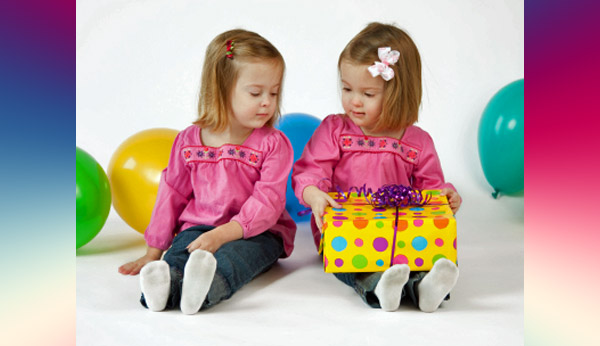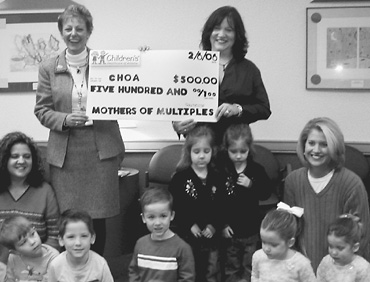Twin U.S. birth rate skyrockets: special parenting tips for raising multiples
A recent report shows an interesting new parenting trend: it appears that many parents are seeing double (literally) these days. The twin birth rate in the U.S. has more than doubled over the last three decades. For a bit of perspective: in 2009 one in every 30 babies born was a twin-an astounding increase over the one in 53 rate in 1980.
Reasons for the “double” increase include more women delaying having a family until over 30 (and for some reason, moms in their 30s are more likely to have twins than younger or older women) as well as the rise in fertility drugs and treatment.
But despite the joy of giving birth, the reality is there are unique parenting challenges in raising multiples. You probably are more exhausted and financially strapped, but there are also special concerns. Among them:
How do I help my children develop their own individual identifies?
Should twins share the same classroom?
Should they have the same friends?
What about those language delays studies show are prevalent with twins
Here are few proven solutions to parenting those wonderful multiples.
Get Knowledgeable
While the basics of good parenting work for any child, there are unique issues when raising multiples. So start by gaining a perspective on the special challenges you may face as a parent.
The Scientific American’s article: “Identical Twins’ Genes Are Not Identical” is a fascinating read. You also might get yourself a subscription to TWINS Magazine or read one of these great resources:
~ It’s Twins! Parent-to-Parent Advice from Infancy Through Adolescence, by Susan Heim. You can follow Susan on twitter @ParentingAuthor
~ Emotionally Healthy Twins: A New Philosophy for Parenting Two Unique Children, by Joan Friedman
~ Raising Twins After the First Year: Everything You Need to Know About Bringing Up Twins—From Toddlers to Preteens, by Karen Gottesman
Encourage Individuality
Multiples often look, act and even think alike, and in addition because they share similar interests, classrooms, scout troops, friends, and even birthdays, others often see them as “package deal.”
What’s more because they share so many similarities, they are constantly compared to one other and fuel competition amongst them. And that’s a huge disservice to their emotional growth. After all, these kids are also separate and unique and deserve to be treated as individuals. So:
~ Find the unique talent or strength in each sibling–singing, karate, guitar, a jazz dancing group basketball, drawing, surfing, or whatever. Then provide individual opportunities to nurture her talent so she is recognized for her special abilities.
~ Encourage them to try at least one separate activity such as scouting, Boys and Girls Club, a swim team. Parents often sign multiples up for the same activities or sport team (I know, it’s easier to carpool but…) which may force competing against each other.
~ Refrain from labeling! Watch out about calling one child more “gifted” or “our little student.”
Make Things Fair, Not Equal
Don’t try to parent so you try to make everything equal by treating each child the same. It’s impossible! Instead, parent for fairness, which means treating each child justly by adjusting your standards and expectations based on each individual child’s needs. For instance:
~ Discipline separately. Lay down the same rules, but discipline each child separately. Never punish them as a unit when only one is responsible).
~ Honor individual needs. Establish the same computer times, but if one needs more time for homework the other knows that school comes first. Set clear bathroom schedules, but if one sibling has an upcoming event the other switches their times. Buy toys for both your kids to share but make sure that each child has their own (and books and clothes) and that each item is clearly labeled.
Talk, Talk, and Talk to Your Children
Multiples spend more time with one another and sometimes even develop a private language. Because they rely on one another they also spend less talking time with parents and are at a greater risk for language delays than singletons and that could impact their language, IQ and academic potential. The influence of parent-child conversation – particularly in the early years–has a profound impact on your children’s language development. So look for ways to talk to your kids during normal, everyday activities.
~ Read to them and find time for frequent family meals (which has great potential for talking and listening).
~ Speak out loud about the things you are thinking—whether it’s your to-do list, dinner menu, or plans to visit your mother so they can hear your inner dialogue.
~ Invite your friends and family over. Just having more adults around will help increase each child’s exposure to speech.
 Weigh the Classroom Scene Carefully
Weigh the Classroom Scene Carefully
While you want to help each sibling develop their own unique individuality and have separate experiences, the parenting premise doesn’t apply when it comes to school.
~ Know the research. All twin development research in the past 20 years finds that “twins who are allowed to be together in preschool and as long as they want to be in the early elementary years seem to make a much better adjustment both academically and socially that those who are arbitrarily separated.” Once the adjustment to school is accomplished, separation in later grades happens naturally and easily.” Of course, decide what you think is best for your kids, but do know the research.
~ Watch for learning disabilities. Some research suggests that twins, especially twin boys, are more likely to suffer from learning disabilities. Fraternal twins have a forty percent chance of sharing learning disabilities while identical twins have been found to have a sixty-eight percent chance. Be alert, and consider having one or both assessed for learning disabilities if there are academic difficulties.
Take Care of Yourself

Multiple kids may double your pleasure but it also doubles the stress. Some research suggests that the added stress of multitasking can put a strain on not only you but also your marriage. For instance:
~ Join a Mothers of Multiples group, such as National Organization of Mother of Twins Clubs or Multiple Birds Canada .
~ Spend time-just a bit-away from your kids. Take a short walk, hire a baby-sitter so you can go to a movie, join an exercise club, or just ride bikes together. The activity doesn’t have to cost a dime.
~ Find “you” time. Find what helps you stay balanced and relaxed and ink that into your daily routine. Setting aside just ten minutes a day may be all it takes but those minutes will help you take on the challenge of parenting multiples.
The Story Every Parent of Twins Should Know: “The Rescuing Hug”
One touching and widely circulated article described how twins born prematurely were placed in separate incubators. A short while later one twin was fighting for her life and no treatment seemed to help. A concerned neonatal nurse decided to put the twins together in one incubator and then watched in awe as the healthy twin snuggled up and wrapped her tiny arm around her sick sister.
Within minutes the sick twin’s blood oxygen rates stabilized and the child recovered. Nothing I’ve ever seen describes the extraordinary bond of multiples.
Remember that regardless of the complications and special challenges, you are parenting a most unique relationship. Enjoy!
Dr. Michele Borba, Parenting Expert
Follow me on twitter @MicheleBorba
I am an educational psychologist, parenting expert, TODAY show contributor and author of 22 books. You can also refer to my daily blog, Dr. Borba’s Reality Check for ongoing parenting solutions, late-breaking news about child development and my TODAY show appearances and find dozens more research-based and practical child-rearing tips in my book, The Big Book of Parenting Solutions.
Resources for this article:
Khanh-Van Le-Bucklin, Twins 101: 50 Must-Have Tips from Pregnancy through Early Childhood, San Francisco: Jossey-Bass, 2008, p. 159-161.
P. Malmstrom and E. Davis “Encouraging Individuality in Twins” iVillage, http://parenting.ivillage.com/baby/bmultiples/0.,43X4-p,00.html Retrieved Sept. 28, 2008, Reprinted from Twin Service, Parent Education Series 300: #310, 1987.
C. Fiedorowicz, “Neurobiological Basis on Learning Disabilities: An Overview. The Learning Disabilities Association of Canada Research. Retrieved Feb 8, 2006 from, http://www.ldac-taac.ca/Research/neuobiological-e.asp.
Photo by Chris Christo, “The Rescuing Hug,” Worcester Telegram & Gazette, Massachusetts, November 18, 1995.

